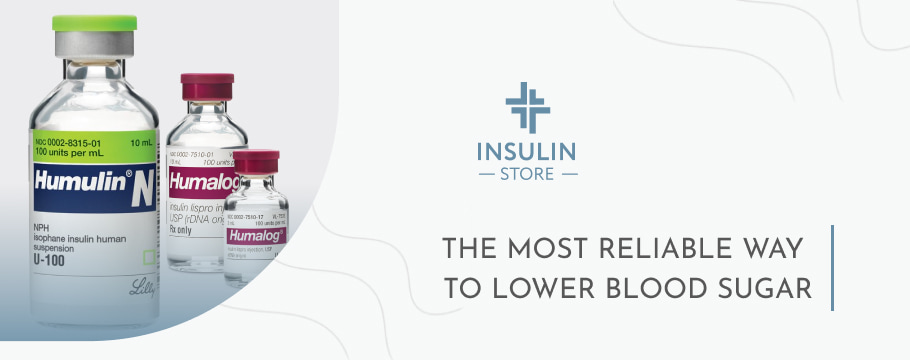Blog

Insulin: The Most Reliable Way to Lower Blood Sugar
Glucose is a universal fuel for the body. Its amount in the blood is what is called the “blood sugar level”. A significant increase in the rate of this level is a problem and a danger! We will figure out how to normalize blood sugar levels, how to lower blood sugar without medication, and whether insulin is the best way to reduce blood sugar.
What is Glucose, and why does It Matter?
Glucose is the main source of energy for brain cells. When blood glucose levels are low, cells do not receive enough energy and go into energy starvation. As a result, primarily the cells of the brain and nervous system suffer and gradually die off. Therefore, blood sugar control is an essential part of treatment. With proper treatment, you still need to control the sugar level and respond in a timely manner if its drops. But, unfortunately, even with the treatment of the disease, complications can still occur.
That is why the basic rule of compensated diabetes mellitus is self-control of glucose levels at home. The better the control of this indicator, the less likely complications will arise. Often people do not control their blood sugar levels but focus on symptoms and well-being. This is totally wrong. Indeed, over time, the body becomes insensitive to changes in sugar. It is important to have accurate measuring instruments and to measure this indicator regularly. Be sure to write down the numbers for further consultation with an endocrinologist.
Why does the Sugar level Rise?
Normally, in a healthy person, the fasting glucose level in the blood should be up to 5.5 mmol/L. But we are talking only about sugar on an empty stomach. Even a healthy person’s blood sugar rises during meals. Therefore, high blood sugar is not necessarily a sign of diabetes.
The reasons for the increase in sugar levels are different:
- consuming a lot of carbohydrates;
- psychological stress;
- bad habits (especially smoking);
- intense physical activity or their complete absence;
- some liver diseases;
- taking hormonal drugs.
One of the most dangerous causes of chronic endocrine disease is diabetes.
Why is High Blood Glucose Dangerous?
For a healthy person
Jumping blood sugar is a stress on the pancreas. In response to excess sugar, the pancreas constantly releases the hormone insulin in order to regulate blood sugar. And constant such increased loads are very harmful to the pancreas – it depletes its resources. This may further affect its work. In addition, the hormone insulin, which is secreted in excess, contributes to the deposition of fat mass and an increase in body weight. As a consequence, obesity, insulin insensitivity – insulin resistance, and type 2 diabetes mellitus can occur.
For diabetics
Impaired glucose metabolism is a pathway to acute and chronic complications of diabetes. It is the sharp drops in sugar levels that lead to organ dysfunction. Coma is an acute complication.
Hypoglycemic coma
This is a condition in which the sugar level drops very quickly, the brain cells are not supplied with food, and the person loses consciousness. If you do not provide assistance in time, a lethal outcome is possible. The opposite of such cases is coma, which can occur due to high sugar.
Blood Glucose Monitoring System
To know how to lower blood sugar levels, you need to understand what the norm is. Values from 3.3 to 5.5 mmol/L on an empty stomach in a healthy person are considered to be normal blood sugar levels. A glucometer will help you find out your level – a small device that measures the sugar level in 1 drop of blood in 5 seconds or the result of a blood test. If your fasting readings are higher than normal and you notice symptoms of diabetes – be vigilant! In order to confirm the diagnosis of diabetes, it is necessary to donate blood from a vein in the laboratory. Meter readings are not suitable for diagnosis – only for home self-monitoring and blood sugar management.
What are the Symptoms of High Blood Sugar Level?
- weakness, fatigue, dizziness;
- headaches and blurred vision;
- dry mouth, thirst;
- frequent urination, especially at night;
- drastic changes in weight, especially in the direction of drastic weight loss;
- itching, flaking;
- white coating on the tongue;
- poor healing of wounds and cuts, purulent rashes on the face.
All of these signs are a consequence of an increase in sugar levels. The best option is to immediately contact your family doctor or endocrinologist in order to undergo a full examination and warn yourself against the development of complications.
Glucose control in the blood comes with major life changes. The first step in diabetes treatment and the basis for effective prevention of diabetes mellitus is lifestyle changes. Lifestyle is a general concept that covers the following components: a properly balanced diet, regular physical activity, weight control, the required length of night sleep, and quitting bad habits.
How to Control Blood Glucose Levels?
The main and simple way is proper nutrition. To be honest, foods that significantly lower blood sugar are more of a myth. But there are healthy and fortified foods that do not affect the sugar level at all – they do not lower or increase it.
Foods that lower blood sugar:
- white and green vegetables: onions, turnips, cabbage, spinach, cucumber, asparagus, zucchini, celery, Jerusalem artichoke, broccoli, cauliflower;
- fruits: garden and forest berries, especially dark-colored: blueberries, blueberries, black currants, apples of sour and sweet-sour varieties, citrus fruits (grapefruit, orange, lemon);
- all cereals, except for rice, semolina, and corn: buckwheat, oatmeal, millet, bulgur;
- white sea fish;
- lean poultry, rabbit, beef;
- nuts: almonds, cashews, hazelnuts, walnuts (but not more than 50 g per day), sunflower and pumpkin seeds;
- condiments: cinnamon, turmeric, cloves;
- drinks: water, green tea, chicory.
But remember: the best and safest treatment is prevention! Even in the absence of health complaints, prevention will be beneficial.
How to Control Blood Sugar?
The answer is simple: proper nutrition but also a healthy lifestyle.
- Give up bad habits. Smoking and alcohol will definitely not help the pancreas and liver cope with already high glucose level.
- Emotional health and adequate nighttime sleep. Reduce stress and make sure you get enough sleep, as, during the nighttime, our organism produces vital hormones for the healthy functioning of all systems.
For the body to work properly, it is necessary to observe the mode of work and rest. For an adult, you need to sleep 6-8 hours a night. It is important that the night sleep should begin no later than 23:00. After all, only at midnight and in the deep phase of sleep, 2 important hormones are released. This is a hormone of circadian rhythms – melatonin, and a hormone responsible for metabolism – growth hormone. People who are awake at 23: 30–4: 00 are deficient in these hormones. The consequences of this are increased weight, general weakness, and decreased performance.
Also, take care of yourself and do not be exposed to stress. If you are constantly in this state, then the accumulation of stress hormones negatively affects the functions of the organism. Today there is an opportunity to discuss your problems and difficult life situations with a specialist. It really helps.
- Physical activity. Regular physical activity and sports are great helpers in the fight against high sugar levels. The more movement, the faster glucose is consumed, and the blood sugar decreases. The fact is that with intense work, the muscles require more glucose for their functioning. Thus, they lower blood glucose levels. Therefore, regular exercise is effective prevention of diabetes and an effective way to reduce weight.
Doctors recommend any kind of exercise for type 2 diabetes. Choose according to your taste. It can be fitness, yoga, running, functional training, swimming, and dancing. Any kind that you practice regularly and with pleasure.
How does Exercise Affect Blood Sugar Levels?
Any type of exercise is suitable for a stable blood sugar reduction. It is important that the exercise is aerobic, that is, with the participation of correct breathing. Aerobic exercise includes all sports except weightlifting and strength training with overweight weights. Therefore, choose according to your taste. It often happens when overweight people cannot choose a sport. Better not to choose a very complex type of load. There are a number of exercises that people of all body weights and obesity can do comfortably.
List of effective exercises for people who find it difficult to exercise too intensely:
- swimming;
- leisurely jogging;
- Biking;
- charging (15–20 minutes daily);
- gymnastics or yoga;
- regular walks.
Insulin Medications for Effective Glycemic Control
We have discussed various ways to lower glucose in the blood naturally. Perhaps, these are ways not to lower it but control and not make it rise. These are efficient recommendations for healthy people who want to lower risk of diabetes development. However, are they as effective for patients who already have diabetes mellitus type 1 or type 2?
It depends. Patients with diabetes type 1 have to take insulin medications compulsory as their insulin levels in the blood are too low to reduce blood sugar. Diabetics with type 2 are more insulin-independent, but in most cases, they need to inject insulin to keep glucose in the blood at the norm. Undeniably, when there is a need to decrease glucose, taking insulin injections is the fastest and the most effective way to do that. The injectable insulin helps to replenish the lack of natural hormones in the blood and get rid of the excess glucose within a relatively short period.
The Bottom Line
Proper nutrition, a healthy lifestyle, sports, and emotional health are the best prevention of high blood sugar! But if you notice symptoms of an increase in levels of glucose, see your doctor and be sure to take a blood test. Be attentive to your health! In case you have diabetes, you must consult with your doctor to choose insulin treatment as well as a combination of diet and exercise.
